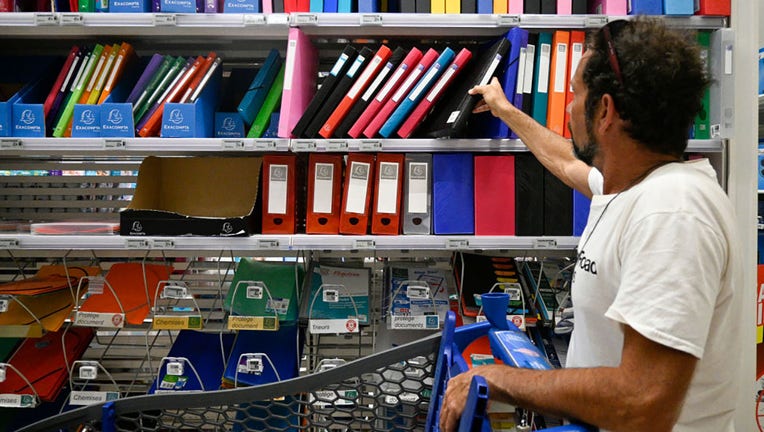Parents putting off bills, buying groceries to pay for back-to-school expenses, survey finds

FILE - School binders, folders, and other supplies, on July 17, 2024. (Photo by MAGALI COHEN/Hans Lucas/AFP via Getty Images)
Children heading back to school means many U.S. parents are bracing for the financial impact of shopping for school supplies and other new gear. In fact, some even admit to sacrificing necessities to ensure their kids have what they need for the year, according to a new survey.
Half of parents surveyed recently by Intuit Credit Karma revealed that they plan to sacrifice necessities – such as groceries and bills – to make sure their kids are prepared for the school year. When looking at Gen Z and millennial parents, specifically, the figure jumps to 60% and 56%, the survey found.
The survey included responses from more than 1,000 U.S. adults, conducted online between July 19 and July 28.
Some 59% of parents with children under 18 said that due to the high cost of living, they plan to spend more money on back-to-school shopping this year, compared to previous years.
Inflation has created affordability challenges for many parents, with 31% saying they’ll be unable to afford back-to-school shopping for their kids. This was particularly true for younger parents in the survey: 39% of Gen Z and 37% of millennials, compared to 28% of Gen X and 18% of Boomers.

What causes inflation?
There are three factors that could lead to inflation which include demand-pull inflation, cost-push inflation and built-in inflation.
Overall, parents said they plan to spend the most money on clothing and accessories for their kids (44%), followed by groceries and food (17%), school supplies (16%), electronic devices (8%) and after-school programs (8%), the survey found.
Taking on debt for back-to-school supplies
More than a third (34%) of parents said they plan to take on debt, such as credit card debt or buy now, pay later loans, in order to pay for their kids’ school supplies, according to the survey.
Specifically, some 31% of parents said they’re willing to take on up to $500 in debt, while 18% said they’d accrue up to $750 in debt, according to the survey. Another 16% of parents said they would be willing to reach $1,000 in debt.
In more extreme cases, roughly one-in-eight (12%) of parents are willing to take on $1,001 to $2,000 in debt, and 4% planned to surpass $2,000, the survey found.
Nearly one-third (30%) of parents said they don’t have money saved for back-to-school expenses.
After-school programs, such as sports and clubs, are another big expense on the minds of parents. One-third (33%) said they expect to take on debt to cover after-school programs for their kids, rising to 44% of Gen Z and 37% of millennial parents, according to the survey.
"Education costs are primarily spotlighted at the college and post-college levels, yet parents are on the hook for school-related expenses as early as pre-K," Courtney Alev, consumer financial advocate at Credit Karma, said in a statement.
"Many parents with young children are likely entering the school year already stretched thin after covering costs for summer childcare, which could be why many parents expect to be in the red after back-to-school shopping this year," Alev added.
Saving on back-to-school supplies
Other research has found that, on average, parents nationwide spend $701 per child, per year, on back-to-school items.
In order to save money, parents in Intuit Credit Karma’s survey said they’re turning to sales and second-hand shopping for their kids’ back-to-school needs in order to save money.
More than half (53%) of parents said they planned to shop Amazon’s Prime Day sales in July for their kids’ school supplies, 61% said they planned to shop at discount stores, and 33% said they would rely on hand-me-downs and/or borrowed items, according to the survey.
This story was reported from Cincinnati.

